In its interim report, the Estonian company Operail reports that in the first nine months the freight volume in Estonia and Finland was a total of 5.2 million tonnes, which is 48% less than in the same period last year. According to Operail, the reason for the decrease in the freight volume is the sanctions against aggressor countries by Estonia and the European Union, which have stopped the transit of Russian fertilizers and Belarusian oil products through Estonia.
Operail's operating income reduced from EUR 55 million to EUR 42 million compared to the same period last year due to the decline in freight volumes. For the nine-month period, the group made a loss of €3.5 million, compared with a profit of €3.5 million in the same period last year. In addition, more than 100 employees have been laid off due to the decrease in the freight volume.
However, the good news is that intra-Estonian multimodal transport has shown strong growth in the first nine months of the year: its volume was 52% higher compared to the same period last year.
“I am glad that the work in the field of intra-Estonian transport has borne fruit and the growth has been strong. We have removed about 16,000 trucks from Estonian roads, thus making the roads safer for all road users and reducing the footprint of the transport sector,” said Raul Toomsalu, Chairman of the Management Board of Operail.
In addition to domestic multimodal operations, the wagon rental business has helped the company recover profits. The company also uses funds accumulated in previous years. Domestic trade, Estonian imports and exports, and lost volumes will not be replaced soon, and Operail is looking for other options to ensure that the future of Estonian freight rail is not threatened.
“The entire railway infrastructure in Estonia has been relying for many years on wagon rental income and large transit volumes. Now, transit volumes have decreased many times, while the railway maintenance costs are the same or increasing along with the general price increase. If local goods are made to be responsible for the maintenance of the entire railway in the future, then these goods will be transported by road due to the price, and the future of the railway as the safest and most environmentally friendly mode of transport in Estonia is in serious danger of disappearing,” explained Toomsalu.

